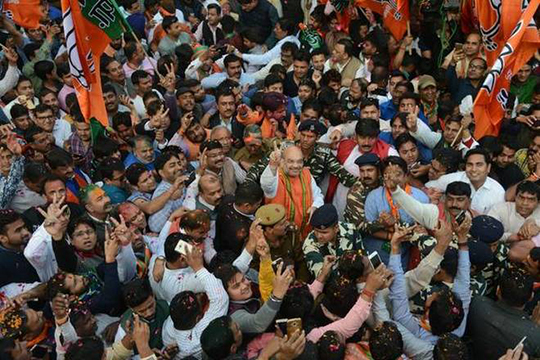New Delhi, Mar 11: The BJP has more than doubled its vote share in Uttar Pradesh to close to 40 per cent since the last assembly elections though there is a slight drop since the Lok Sabha polls of 2014.

The BJP did even better in the neighbouring Uttarakhand with over 46 per cent vote share, though down from nearly 56 per cent in the 2014 Lok Sabha polls.
In Punjab, where the Congress was headed for a victory, the BJP saw its vote share decline to just about 5 per cent, down from nearly 9 per cent in the 2014 elections. The party also saw its vote share drop in Goa to nearly 33 per cent from over 54 per cent though it saw a big jump in Manipur to close to 35 per cent from 12 per cent.
The BJP’s rival parties — the SP, the BSP and the Congress — have all seen their vote shares decline sharply since the 2012 assembly polls in Uttar Pradesh though there is surprisingly not much change since their share in the Lok Sabha elections of 2014.
While the BJP has emerged victorious in UP after 14 years, the rivals appeared to have failed in converting their vote shares into an equivalent seat share.
As per the latest trends, the BJP was seen heading for victory on nearly 300 seats in the 403-member Assembly.
In terms of the latest vote share data, as available with the Election Commission, the BJP polled 39.6 per cent, followed by the SP and the BSP with 22 per cent each while the Congress was seen getting over 6 per cent.
Among others, the Rashtriya Lok Dal was seen getting less than 2 per cent vote share and the CPI had just 0.2 per cent, while 0.9 per cent votes were cast for NOTA (None Of The Above).
Independent candidates who were seen as leading on three seats polled 2.5 per cent votes.
The BJP had got 42.6 per cent vote share in the 2014 Lok Sabha polls in Uttar Pradesh while the same was just 15 per cent in the last assembly elections in the state in 2012.
The SP’s vote share has remained largely unchanged from 22.3 per cent since 2014, but has come down from over 29 per cent in 2012.
For the Mayawati-led BSP, the vote share has actually gone up from just below 20 per cent in 2014, though down from nearly 26 per cent in 2012. For the Congress, it has been a path down the hill from 7.5 per cent in 2014 and from 11.6 per cent in 2012.
In Goa, the seat tally was seen divided between the BJP and the Congress, through the former had a better vote share of over 33 per cent as against 28 per cent of the latter.
Manipur, where also the results appeared to be divided, the BJP polled larger number of votes at over 35 per cent as against 33 per cent for the Congress.
In Punjab, the BJP and its ally Shiromani Akali Dal got 5.2 per cent and 25.4 per cent votes, respectively, lower than more than 38 per cent share of the Congress.
The Aam Aadmi Party, which has a government in Delhi and was shown in exit polls to have done well, got nearly 24 per cent votes, but looked much weaker on seat tally. It did worse with just about 6 per cent share in Goa, the other state where AAP had sought to claim a presence.
In Uttarakhand, another state where the BJP was headed for a massive majority just like UP, the Congress polled 33.5 per cent, while independents also got more than 10 per cent votes.








Comments
Add new comment